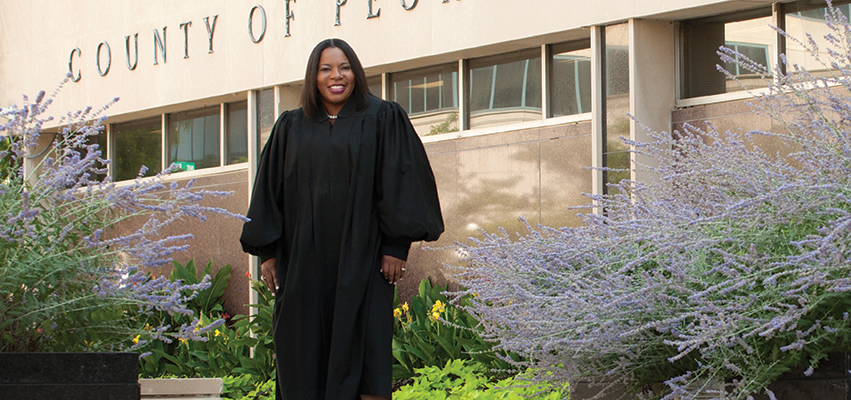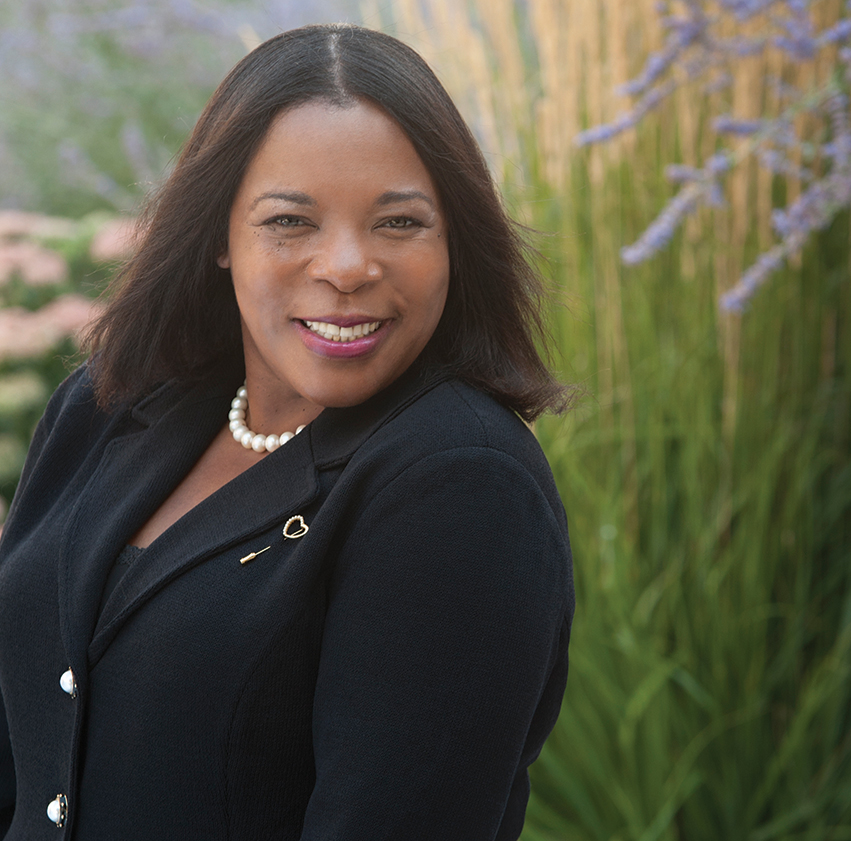Judge Alicia Washington

A native Peorian, inspiring others inside and outside the courtroom
I am the proud daughter of two loving parents. My mother is my most treasured role model, my father is my hero, and my sibling is my biggest cheerleader. My faith and love for family influenced me from an early age.
Reading was a key component of our days at home with my parents. I learned about great individuals in history who helped change our nation for the better—and many of them possessed law degrees. I wanted to assist and speak up for people who were unable to communicate for themselves in a formal way. As a child, I marveled listening to older relatives describing life events and comparing them to the publications found at the Peoria Public Library.
I attended wonderful schools in District 150, and I am a proud graduate of Peoria High School. I attended the University of Illinois in Urbana Champaign and graduated with a Bachelor of Science degree in business administration/marketing. My education continued at Bradley University, where I graduated with a Master of Arts degree in leadership in human service administration. Dr. Barbara Penelton allowed me to serve as her graduate assistant throughout my time at Bradley. I graduated law school with a Juris Doctorate from Michigan State University. Throughout each step, I worked multiple odd jobs to survive. The jobs I worked really motivated me to finish school—some were more challenging than others to sustain.
Tell us about your work as a civil attorney with the Janssen Law Center and with Prairie State Legal Services.
I had the pleasure of working for two incredible legal legends in Peoria. Ironically, at one job the citizens qualified for our services based on economic need, while at the other, I consistently sought monetary awards for individuals. Each job provided me a unique forum to learn about the human needs of multiple citizens. I realize we all walked on the same streets; however, we may have unique legal needs.
Lisa Wilson served as my first legal supervisor at Prairie State Legal Services. She taught valuable, professional legal skills and helped broaden my mind on how to assist the most disadvantaged citizens in the five-county area. She was a ferocious advocate and a great legal scholar—an example of how a female attorney could make a difference in a male-dominated industry. She instructed me to embrace professionalism and to prepare for each case knowing the immediate impact it could have on an individual’s life.
Jay Janssen was the epitome of a strong, gifted leader. He helped shape me into a true advocate for the injured and really emphasized how we are all one incident away from needing legal services. On any given day, I viewed the faces of those hurt, widowed or suffering during terrible circumstances, and I would put my effort in place to assist legally. I also enjoyed encouragement from Joan Janssen, who demonstrated how to utilize talents to serve others through various volunteer efforts in this fine city. I understood that whether I was fighting for a domestic violence victim or an injured party seeking compensatory damages, I needed great listening skills in order to communicate the story to the proper decision maker.
What was the transition from being an attorney to serving as judge like? What has surprised you most about your new position?
My transition was assisted by multiple judges who serve throughout the State of Illinois and have poured into me a wealth of knowledge. Our Chief Judge of the Tenth Judicial Circuit encourages me to attend continuing education sessions that will assist me in the future on the bench. Retired and current members of the judiciary have visited and encouraged me along the way. While serving citizens daily as a judge, I was most surprised with how quickly the time passes.
What is a typical day like for you? What types of cases do you handle?
I currently serve in Traffic Court and have a full docket on most days. I typically have the opportunity to serve 50 or more people a day. I have two sessions—one begins at 9am and the other at 1pm. We often schedule bench trials, where the judge decides the innocence or guilt of the individual charged. Plea deals are reviewed daily. I hear multiple motions and work daily with well-informed public defenders, prosecutors and private counsel. The bailiffs do an excellent job of assisting us, my clerks have been helpful, and the security is consistently outstanding at securing the public and staff through emotional moments. While seated in Traffic Court, I also hear conservation cases. This assignment includes working in a high-volume environment, understanding that many decisions affect the daily lives of how people move in this community throughout the day.

What is your judicial philosophy?
I believe that respect and dignity to bring honor to the court should be maintained. I believe that fair application of the laws should be applied to citizens regardless of their identifiers to the outside world.
Please reflect upon your major accomplishments of 2016.
One of my major accomplishments this year included being able to communicate my thankfulness to those who assisted me through my journey of life up to this point. Through my transition to serve as a judge, I have been able to thank my kindergarten teacher, high school teachers, grade school coach, old friends, neighbors and family for pouring positive moments into me and molding me. Chuckling inside, I remain hopeful that others will continue to encourage and guide others like young Alicia to strive for their best. I am amazed at my journey thus far, and hope to motivate other citizens to dream beyond what their eyes show them daily. I want them to know you need to work hard and put in significant effort while dreaming to be prepared when opportunity arises.
Describe your community involvement and some of the causes that are near and dear to you.
I believe that our community has wonderful agencies and organizations of all types. I was a recipient of services in the community programs offered at the Tri-County (Peoria) Urban League. Magnificent tutoring and daily programs are offered for youth and adults at this facility. I had the privilege of serving a short period of time on the Crittenton Centers board, and their work is exceptional. I encourage others to visit and research these organizations to understand how much love is being displayed to families.
What is your secret to maintaining a balance between your work and personal life?
I do not take life's moments for granted, and understand that another day is not promised. I try to enjoy a great moment each day. Structure allows me to balance the two important elements of life.
What is your leadership style or philosophy?
I believe that we can all learn at all stages in life. On the bench, my leadership style is simple and clear. I present rules and encourage others to comply while inside the courtroom. The rules assist citizens inside the courtroom to remain safe and experience the legal process with a basic understanding during complex moments.
What do you consider to have been the most pivotal point in your career?
I lost a true friend who was also an attorney prior to being appointed to the bench. She left me a text, and I did not have a chance to return the message as I was busy preparing for a program. I later learned she had passed away suddenly as a result of a horrific crash. I attended the funeral and was struck with memories of dreams and efforts we both shared. As a result of this loss, I decided that whatever I wanted to pursue in my career, I would. I realized I did not want to delay seeking my dreams. I knew right then that I had to step out and try to live life to the fullest. There is nothing like viewing a departed classmate—it gave me perspective.
Did you have a mentor in the early stages of your career?
My mother was my first role model. She worked at a legal aid facility in the community decades ago. Valerie Ortique-Barnett served as an attorney with the National Labor Board, and my parents invited her to our home when I was in high school; she mentored me consistently through undergraduate school until today. I laugh because my parents could have brought anyone home, but they chose a rock star of a person to assist me through the twists of turns of academia and life. She helped me select classes and advised me to involve myself in distinct groups to develop professionally and personally. I admit it helped having Valerie around to humanize the profession. I believe one should find a person they can communicate with candidly to serve as a role model.
Laraine Bryson allowed me to travel with her and hear her stories about law school. She provided opportunities for me to develop my talents through employment and mentored me on the professional demands of serving the community. Some of my mentors did not look like me. I want people to understand that often your mentor may not have the same background as you; however, the beauty of mentoring is that the two of you focus on your future. Many of the first attorneys I practiced law against served as mentors in the hallways or during breaks; I believe I pinched off the knowledge of many to form my own style. Jay Janssen left an impressionable mark and provided wonderful opportunities for my professional growth.
What’s the hardest life lesson you’ve had to learn?
That you will have to stand alone at times, so you better be prepared for multiple challenges and love yourself.
What is the best advice you ever received?
When I was a child, my parents would read us many books. One of my favorites that had a very simple meaning was The Little Engine That Could. I would constantly—on the basketball court, during school or in the courtroom—silently recite, “I think I can…” If you believe it, you can achieve it; it’s that simple.
What advice would you give to a young, up-and-coming female professional?
To educate oneself in their craft and talk to older members of their specialty to hear how they overcame disappointments and struggles. Everyone has a story. You have to listen to learn.
Young leaders need to attend as many workshops as possible and read publications of all types to enhance their knowledge base. Peoria has wonderful speakers visit from all across the globe to help educate our minds in various areas. The more diverse your knowledge base, the easier it is to serve the public. Some of the best advice in life may come from someone through life lessons versus a formal education, so it is important to interact with assorted groups.
In your opinion, what is the greatest struggle working women face today?
Many women do not find people willing to mentor them. I suggest finding someone who will pick up the phone, answer your questions and listen to your concerns without hesitation. iBi

